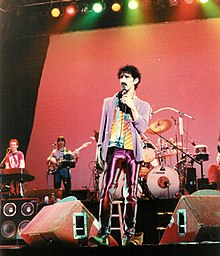Zappa later expanded on his television appearances in a non-musical role. He was an actor or voice artist in episodes of Shelley Duvall's Faerie Tale Theatre, Miami Vice and The Ren & Stimpy Show. A voice part in The Simpsons never materialized, to creator Matt Groening's disappointment (Groening was a neighbor of Zappa and a lifelong fan).
Producing
1976 saw the release of Good Singin', Good Playin' by Grand Funk Railroad and produced by Zappa.
1980s–1990s
In 1980, Zappa cut his ties with record distributor Phonogram after the label refused to release his song "I Don't Wanna Get Drafted". It was picked up by CBS Records and released on the Zappa label in the United States and Canada, and by the CBS label internationally.
After spending much of 1980 on the road, Zappa released Tinsel Town Rebellion in 1981. It was the first release on his own Barking Pumpkin Records, and it contains songs taken from a 1979 tour, one studio track and material from the 1980 tours. The album is a mixture of complicated instrumentals and Zappa's use of sprechstimme (speaking song or voice)—a compositional technique utilized by such composers as Arnold Schoenberg and Alban Berg—showcasing some of the most accomplished bands Zappa ever had (mostly featuring drummer Vinnie Colaiuta). While some lyrics still raised controversy among critics, some of whom found them sexist, the political and sociological satire in songs like the title track and "The Blue Light" have been described as a "hilarious critique of the willingness of the American people to believe anything". The album is also notable for the presence of guitarist Steve Vai, who joined Zappa's touring band in late 1980.

Niciun comentariu:
Trimiteți un comentariu